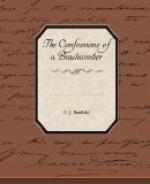A heavy, slovenly-patched mantle of leafage, impervious to sunlight, covers the Isle of Timana, creating a region of perpetual dimness from western beach to eastern precipice, where orchids cling and palms peer on rocks below. All the vegetation is matted and interwoven, only the topmost branches of the milkwood escaping from the clinging, aspiring vines. Tradition asserts that not many years since Timana was much favoured by nutmeg pigeons, now sparsely represented; but the varied honey-eater and a friar bird possessing a most mellow and fluty note, cockatoos and metallic starlings are plentiful. Although there is no permanent fresh water, the pencil-tailed rat leaves numerous tracks on the sand, and scrub fowls keep the whole surface perpetually raked.
From a mound adjacent to the beach a black boy brought fifteen eggs as we picnicked on the beach, and though some of them were nigh upon hatching, not one was covered with white ants—which, an authority asserts, particularly like crawling over the eggshells, so as to be ready when wanted by the chicks. Nor have I ever seen an instance of this alleged exhibition of self-sacrifice on the part of the white ant. Another boy had eaten his very substantial lunch, but the eggs were tempting and he baked two. One, and that new-laid, is ample for an ordinary mortal. The condition of the first resembled that which the embarrassed curate described as “good in parts”; but “Mickie” was not nice over a half-hatched egg. Indeed, was it not rather more piquant than otherwise? The second proved to contain a fully developed chicken. Now the chick emerges from the shell feathered, and this, but for the unfortunate accident of discovery, would have begun to scratch for its living in a day or so. Mickie flicked away the fragments of shell from the steaming dainty and laid it snugly on a leaf. “That’s for Paddy”—an Irish terrier, always of the party. It was an affecting act of renunciation. Presently “Paddy” came along; but “Paddy,” who, too, had lunched, bestowed merely a sniff and a “No, thank you” wag of the tail. “What, you no want ’em? All right.” No second offer was risked, and in a moment, in one mouthful, the chick was being crunched by Mickie, feathers and all. The menu of the Chinese—with its ducks’ eggs salted, sharks’ fins and tails, stewed pups, fowls’ and ducks’ tongues, fricasseed cat, rat soup, silkworm grubs, and odds and ends generally despised and rejected—is pitifully unromantic when set against the generous omnivority of Australian blacks.
A mile beyond Timana is Bedarra, with its lovely little bays and coves and fantastically weathered rocks, its forest and jungle and scrub, and its rocky satellite Pee-rahm-ah.
Several of the most conspicuous landmarks are associated in the minds of blacks with legends, generally of the simplest and most prosaic nature. About this rough rock Pee-rahm-ah is a story which in the minds of the natives satisfactorily accounts for its presence.




